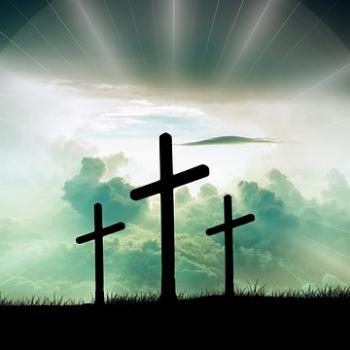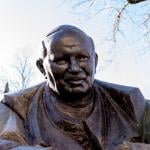
The Religion Guy’s Answer:
This is pretty much the ultimate Q&A topic for Patheos. There’ve been some intriguing developments lately, so let’s bring the unending debate up to date. For one thing, this week’s Pew Research Center report on a survey of 36,908 adults indicates 21st Century America’s much-publicized religious decline has bottomed out.
Early in this century, popular books by so-called “New Atheists” variously assailed believers in God as stupid and deluded if not downright evil. Religious parents were even accused of “child abuse” for encouraging their own children to believe (though atheists, of course, did the same for unbelief).
Why Believe in God? Why not?
That era’s biggest celebrity atheist was Ayaan Hirsi Ali, a feminist activist hailed as among Time magazine’s 100 “most influential people in the world.” She spurned theism, though less harshly, and focused on her youthful faith of Islam, resulting in death threats. But nowadays Ali regrets and rejects her atheistic advocacy. In September 2023, she was baptized as a Christian with her husband, distinguished historian Niall Ferguson, and their two sons.
Ali’s conversion is mentioned in an important book on God, out this month. Writer Ross Douthat is experienced at addressing secularized and sophisticated audiences as a New York Times columnist. He prods readers to reconsider what modern science tells us and insists religion provides “an entirely reasonable perspective on the nature of reality and the destiny of humankind,” plus it’s desirable for our well-being.
Should Everyone Be Religious?
The title is bold: “Believe: Why Everyone Should Be Religious“. He sees good “empirical reasons to think that the divine is real and worth pursuing.” While “nonbelief requires ignoring what our reasoning faculties tell us,” the “religious perspective grapples more fully with the evidence before us” and, compared with skepticism, “has the better case by far for being true.” So we have an “obligation” to seriously consider it.
Others have argued that science suggests a universe designed by some ultimate intelligent entity beyond us, a concept that explains human consciousness, but rarely with such readable and jargon-free style. We’ll see, but believers might hope “Believe” eventually becomes a popular case for “mere religion” with a bit of the impact of C.S. Lewis’s “Mere Christianity,” a classic and still-on-sale 1952 defense of that specific religion. Douthat mostly defends religion in general and only at the end depicts the “case study” of his own turn to Catholicism.
What follows sketches some of his case.
Douthat starts with the “design” argument and what science has revealed about the material universe humans inhabit. We observe “at every level of visible existence … regular-seeming, complex, and predictable systems,” and likewise “complex machines of flesh and bone, filament and fiber” in “the everyday workings of the human body.”
That produces the common human intuition “that nothing so vast and complex and beautiful could exist by simple accident.” Either the cosmos itself is divine or “some Mind or Power must have made or organized all this matter for a reason.” If so, “it would be strange not to wonder about its purposes or where you fit into them, self-defeating not to care about how your own life aligns with the story in which you have been placed.”
Facts cry out for explanation
Modern science has strengthened these perceptions “at much deeper levels” of the “cells and atoms, physical laws and mathematical equations” in nature that “cry out for explanation.” Darwin’s story of evolution from “bacteria to Bach” did not dethrone God and in fact requires that “law-bound material substructure” and “the larger life-generating system of the universe itself.”
Douthat further contends that “mind is not reducible to matter” Each person experiences self-consciousness that exists “without being reducible to physical substances and their interactions.” We sense “some dependent relationship with higher minds, or with the highest Mind of all.” “Something extra seems added to the human race” that allows understanding of nature and also imitation of the creation’s “order and beauty” seen in human inventions in technology or the fine arts.
The “anthropic” argument examines evidence that the universe is “precisely balanced, exquisitely poised, in the alignments necessary to generate our specific kind of biological life,” that is, intelligent creatures who think about these things. Douthat notes that Professor Stephen Barr provides eleven examples of this fine-tuning in “Modern Physics and Ancient Faith.” One example: the tiniest alteration in the forces that bind elements within the atom would make hydrogen impossible. “No hydrogen, no water, no water, no us.”
Other evidence Douthat examines includes the persistence of faith among masses of people in all cultures and times, and many individuals’ ineffable experiences of the divine.
In summary: “The idea that the cosmos was intended, that mind is more fundamental than matter, that our minds in particular have a special relationship to the physical world and its originating Cause – all of these ideas have had their plausibility strengthened, not weakened, by centuries of scientific success. We have much better evidence for the proposition that the universe was made with human beings in mind.” Therefore, God.
Three barriers to belief
Douthat wrestles with three chief barriers to belief. There are the admitted evils too often committed by religious institutions, and religions’ sexual rules are so unpalatable to many moderns. Hardest of all is how to understand why God allows “wicked things to happen.” Douthat pursues thinking on this as ancient as the Bible, with added credibility from the fact he himself coped for years with incurable pain.
An unusual aspect of “Believe” is Douthat’s how-to for seekers weighing the many religious options. Why not just concoct your own self-made spiritual path? “You are probably not a religious genius.” He says it’s fine to choose a religion that’s comfortable due to friendships, family heritage, or culture. And he recommends examining the four biggest world religions that have so long proven themselves, Christianity, Islam, Hinduism, or Buddhism. (The Guy would include one small faith, Judaism, under the Christian category due to broad similarities.)
Added note: These days, it’s no big deal that an evangelical publisher like Zondervan issues a book by Douthat, a Catholic convert from Protestantism. What’s notable is Douthat’s greater respect for the value of non-Christian religions than is customary among evangelicals.
For more on the God question, there’s this 2024 debate between convert Ali and a leading New Atheist, her good friend Richard Dawkins.
Changing subjects, The Guy needs to pay tribute to eminent University of Chicago historian Martin E. Marty, who died this week. Others are assessing his large body of scholarship. But reporters greatly appreciated his amiable availability to provide knowledgeable analysis of just about any religious news that was breaking.














